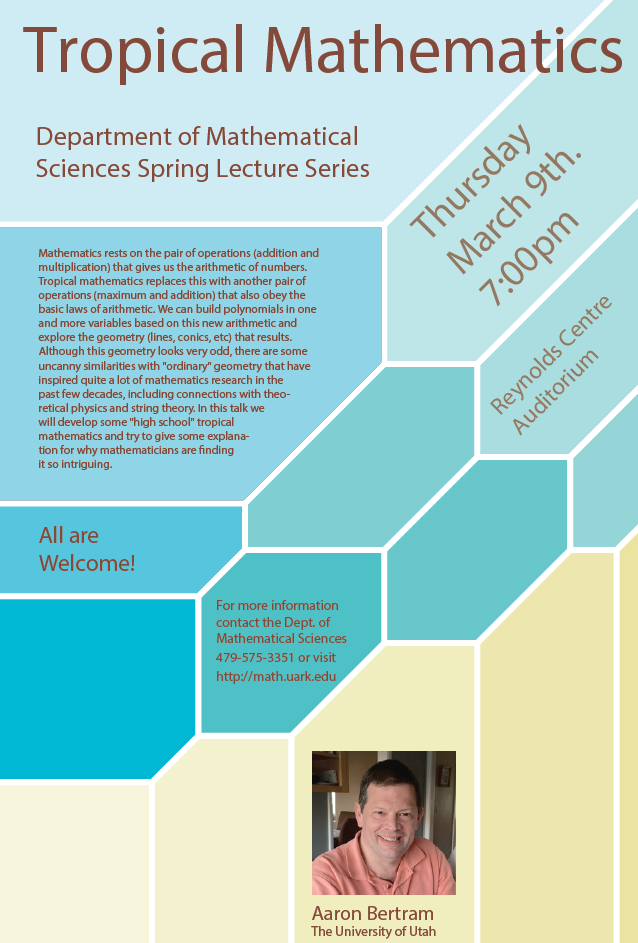Department of Mathematical Sciences
850 West Dickson Street, Room 309
University of Arkansas
Fayetteville, AR 72701
P 479-575-3351
F 479-575-8630
E-mail: math@uark.edu
Public Lecture Archives
Mathematical Models: a World of Insight
Lisette de Pillis (Norman F. Sprague Professor of Life Sciences and Professor of Mathematics, Harvey Mudd College)
May 5, 2023 (6:00 pm CST), in the Reynolds Center Auditorium, Registration is Not Required.
Abstract: Mathematical models hold the keys to understanding some of the most interesting and complex phenomena in the natural world! In this talk, we will explore how to harness the power of mathematical modeling to answer challenging questions that may at first seem unsolvable. Can an overflowing bathtub help us figure out how to achieve herd immunity in a pandemic? Can the behavior of a lynx help us understand how human immune cells fight cancer? By making a few simplifying assumptions, we can draw parallels between natural systems that may appear radically different on the surface to unlock new levels of understanding the world around us.
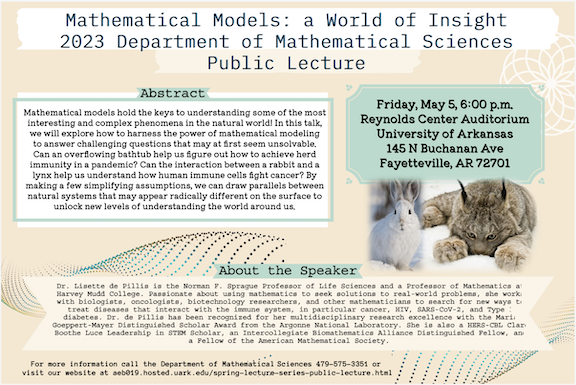
Challenges in Smart Patient Monitoring: from Raw Data to Decision Support
Sabine Van Huffel (Professor Emerita in the Department of Electrical Engineering at KU Leuven)
May 4, 2022 (6:00 pm CST), Registration is Required.
Abstract: After a general brief introduction to the field of smart patient monitoring under study, the underlying mathematical and numerical challenges will be highlighted when capturing the raw sensor data and trying to transform these into interpretable knowledge for medical diagnostics. Attention will be focused on the power of matrix/tensor algebra and data-driven AI in digital healthcare.
In particular, the power of the underlying mathematical layers (without explaining the theory) will be illustrated in a variety of case studies in smart patient monitoring, such as wearable health taking epilepsy monitoring as use case , sleep staging, neonatal brain protection, and cancer diagnostics.
Each key problem will be introduced including the main algorithms based on advanced signal processing and machine (deep) learning, together with the associated challenges before using these in clinical practice. This research strongly benefits from a long-term collaboration with diverse units ofUZ Leuven, the largest University hospital of Belgium.
For more information and additional references, see www.esat.kuleuven.be/stadius/
![Spring Lecture Series, Public Lecture Poster [PDF]](/departments/math/_resources/images/events/sls-public-lecture-2022.jpg)
"Harnessing the Power of Mathematics for High Performance Computing"
Ann Almgren (Lawrence Berkeley National Laboratory)
April 5, 2021 at 6:00pm Virtually
Abstract:
Mathematics has always played a critical role in scientific discovery through computing. The increasing power and heterogeneity of modern computer architectures provide the opportunity to understand physical systems with higher and higher fidelity. But as the range of length and time scales we want to probe becomes ever greater and the number of different types of physical processes we need to model becomes larger and more varied, the challenge of building effective simulation methodologies grows along with the opportunities. Mathematics provides the key to meeting this challenge. It allows us to decompose complex problems into their core elements and express how these elements are coupled. It allows us to abstract physical processes into equations and design algorithms to solve them. In addition, casting problems in the language of mathematics exposes the commonality between diverse applications. Exploiting this commonality enables us to capture complex algorithms in efficient high-performance software that provides building blocks for new algorithmic exploration and scientific discovery.
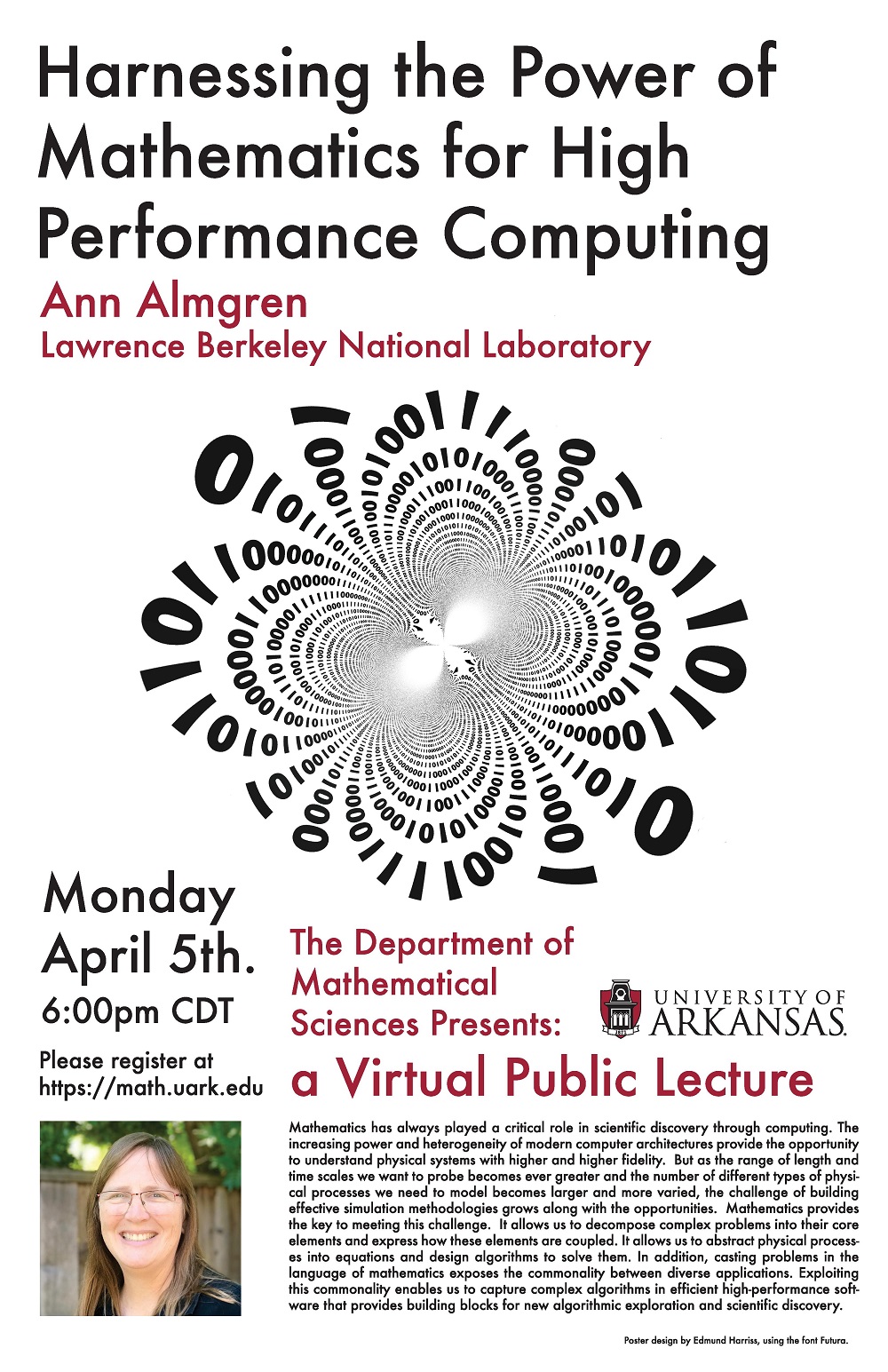
"The Mysterious Numbers of Professor Hensel"
Fernando Gouvêa (Colby College)
April 5, 2018 at 7:00pm
Abstract:
Kurt Hensel didn't really set out to invent a new kind of number. He stumbled onto
the p-adic numbers while trying to invent a new way to write down numbers of the usual kind.
Nevertheless, the p-adic numbers that surprised him in the 1900s have turned out to
be quite useful, so much so that this year's Spring Lecture Series is all about "p-adic
Cohomology." I will ignore the "cohomology" part and instead tell the story of Kurt
Hensel and his discovery. The only thing you need to know to follow along is arithmetic
and a willingness to explore strange new (number) worlds.
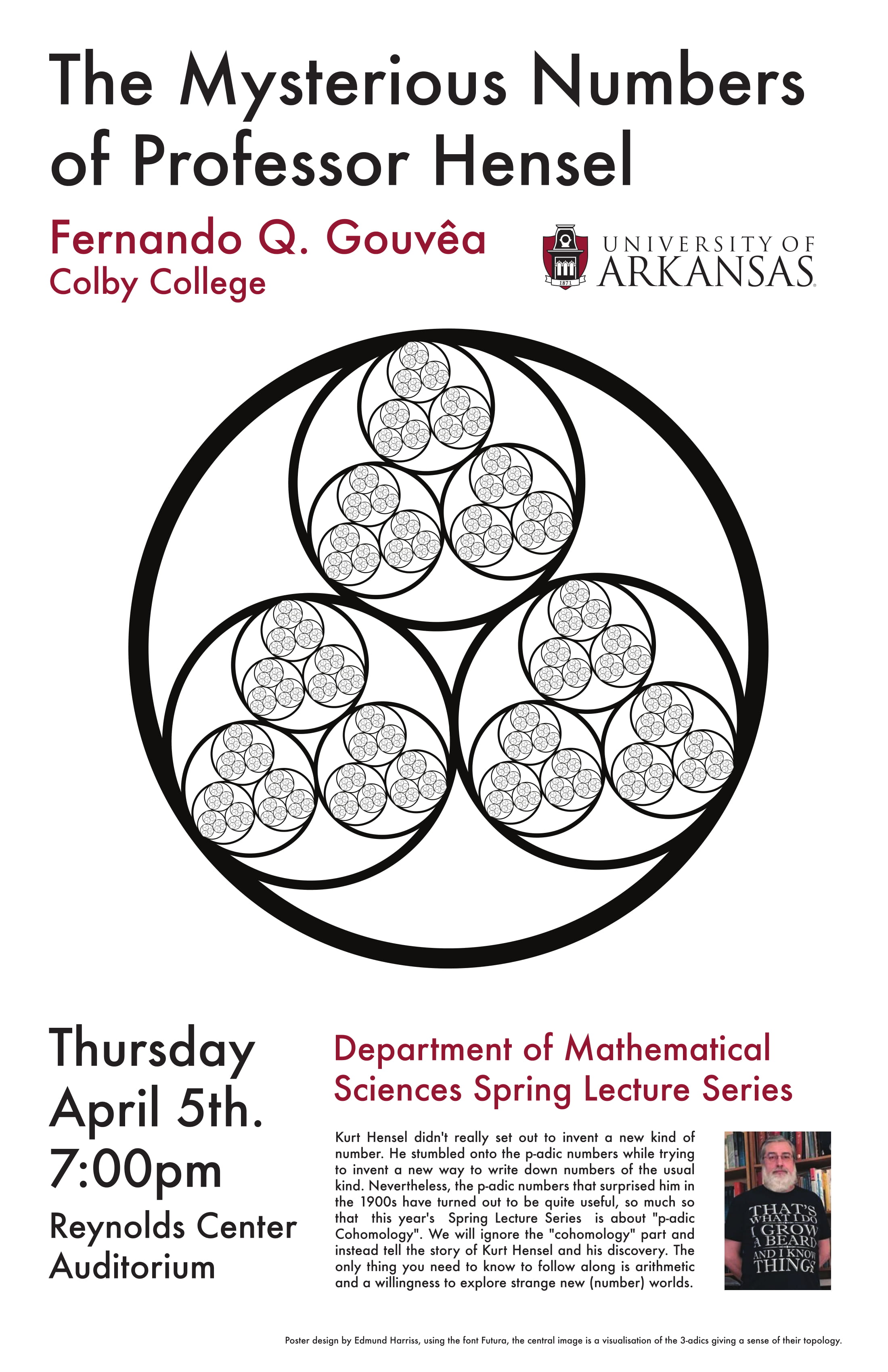
"Tropical Mathematics"
Aaron Bertam (University of Utah)
March 9, 2017
7:00pm to 8:00pm in the Reynolds Auditorium, Room 120.
Abstract:
Mathematics rests on the pair of operations (addition and multiplication) that gives
us the arithmetic of numbers. Tropical mathematics replaces this with another pair
of operations (maximum and addition) that also obey the basic laws of arithmetic.
We can build polynomials in one and more variables based on this new arithmetic and
explore the geometry (lines, conics, etc) that results. Although this geometry looks
very odd, there are some uncanny similarities with "ordinary" geometry that have inspired
quite a lot of mathematics research in the past few decades, including connections
with theoretical physics and string theory. In this talk we will develop some "high
school" tropical mathematics and try to give some explanation for why mathematicians
are finding it so intriguing.
"What Have We Learned From the Archimedes Palimpsest"
Reviel Netz (Stanford University) and author William Noel
April 14, 2016
7 p.m. Reynolds Center Auditorium
Reception to follow
This event is open to the public
Presenting the Public Lecture at 7 p.m. Thursday, April 14, in the Reynolds Center Auditorium is Reviel Netz, Professor of Classics at Stanford University and co-author, with William Noel, of the widely popular The Archimedes Codex which was awarded the Neumann Prize for best book in the history of mathematics aimed a broad audience. His lecture “What Have We Learned From the Archimedes Palimpsest” is a fascinating story of a thirteenth century prayer book with extraordinary importance to the history of science. The use of multispectral imaging on this medieval Byzantine prayer book--written in Greek, completed by April 1229, and probably made in Jerusalem-- has revealed the parchment had previously been used for other books written in the second half of the 10th century, almost certainly in Constantinople. These other pages contain no less than seven treatises by Archimedes, and also works by the 4th century BCE Athenian orator Hyperides, and a 3rd century CE commentary on Aristotle's Categories.
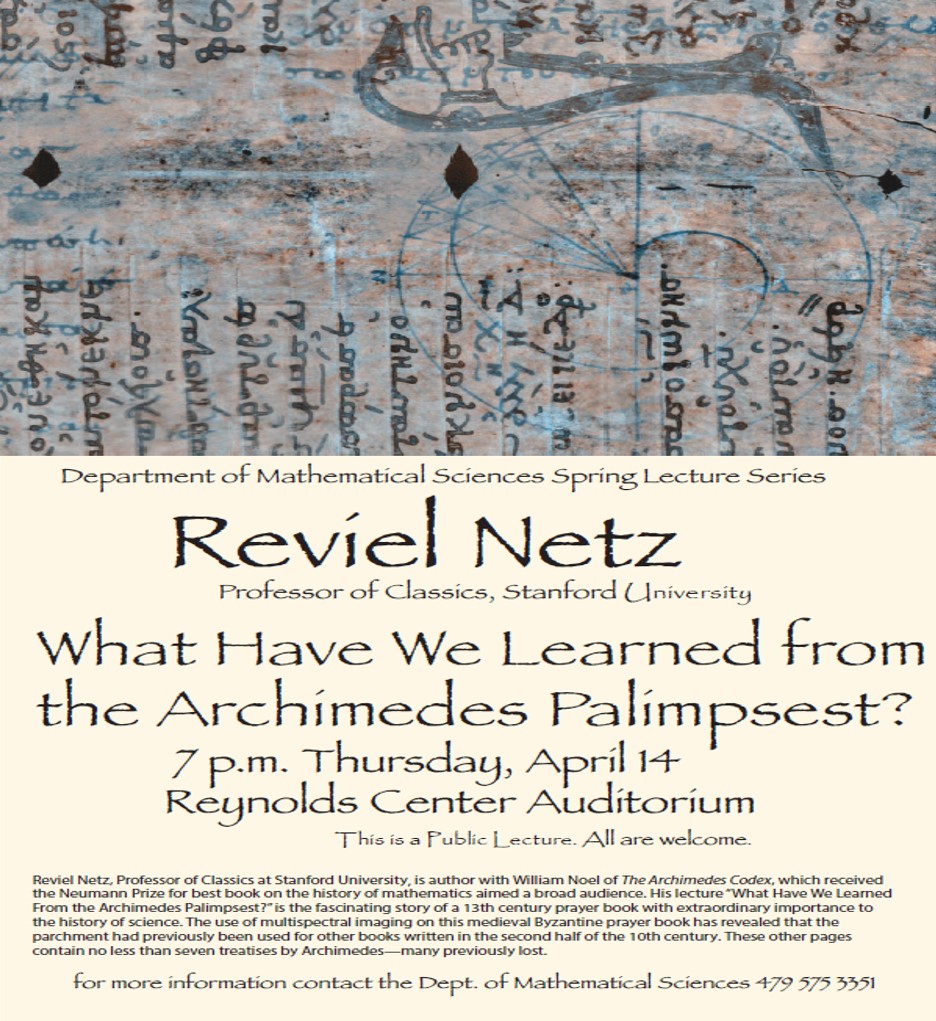
Ravi Vakil of Stanford University will present "The Mathematics of Doodling"
March 5, 2015
7 p.m.
Reynolds Center Auditorium
Reception to follow
The event is open to the public
Doodling has many mathematical aspects: patterns, shapes, numbers, and more. Not surprisingly, there is often some sophisticated and fun mathematics buried inside common doodles. Vakil will begin by doodling, and see where it takes us. It looks like play, but it reflects what mathematics is really about: finding patterns in nature, explaining them, and extending them. By the end, the audience will have seen some important notions in geometry, topology, physics, and elsewhere; some fundamental ideas guiding the development of mathematics over the course of the last century; and ongoing work continuing today.
Dr. Ravi Vakil is a Professor of Mathematics and the Robert K. Packard University Fellow at Stanford University. He has received many awards and distinctions, including an American Mathematical Society Centennial Fellowship, a Frederick E. Terman fellowship, an Alfred P. Sloan Research Fellowship, a National Science Foundation CAREER grant, the presidential award PECASE, the Brown Faculty Fellowship, the Coxeter-James Prize from the Canadian Mathematical Society.
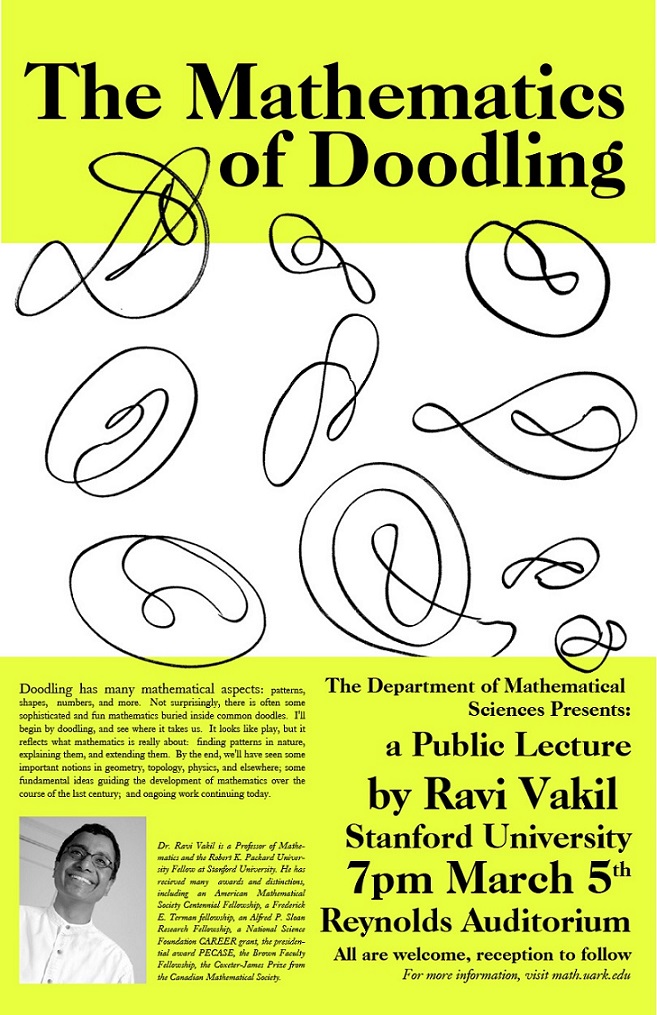
The Arkansas Public Lecture is sponsored jointly by the National Science Foundation and the University of Arkansas as part of the 40th annual Spring Lecture Series in the Mathematical Sciences.
"Blown Away: What Knot to Do When Sailing"
A special public lecture by Sir Randolph Bacon III, cousin-in-law to Colin Adams (Williams College)
Thursday, April 10 at 7 p.m.
Reynolds Center Auditorium (RCED)
The event is open to the public.
A reception will follow the talk.
Being a tale of adventure on the high seas involving great risk to the tale teller, and how an understanding of the mathematical theory of knots saved his bacon. No nautical or mathematical background assumed!
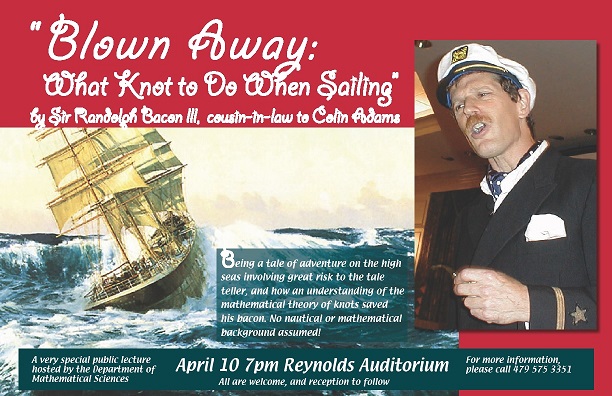
Colin Adams Bio
Colin Adams is the Thomas T. Read Professor of Mathematics at Williams College. He received his Ph.D. from the University of Wisconsin-Madison in 1983. He is particularly interested in the mathematical theory of knots, their applications and their connections with hyperbolic geometry. He is the author of “The Knot Book”, an elementary introduction to the mathematical theory of knots, ”Why Knot?”, a mathematical comic book with attached toy and “Riot at the Calc Exam and Other Mathematically Bent Stories”, a compendium of humorous math stories. He is the co-author of the humorous supplements “How to Ace Calculus: The Streetwise Guide” and “How to Ace the Rest of Calculus: the Streetwise Guide” as well as the textbook “Introduction to Topology: Pure and Applied”. He also appears with Thomas Garrity in “The Great Pi/e Debate”, ”The United States of Mathematics Presidential Debate” and “The Derivative vs. the Integral: The Final Smackdown”, DVD’s of humorous debates on mathematical topics that are available from the Mathematical Association of America. He has written a variety of research articles on knot theory and hyperbolic 3-manifolds. He is a recipient of the Haimo National Distinguished Teaching Award from the Mathematical Association of America(MAA) in 1998, an MAA Polya Lecturer for 1998-2000, a Sigma Xi Distinguished Lecturer for 2000-2002, and the recipient of the Robert Foster Cherry Teaching Award in 2003. He is also the humor columnist for the Mathematical Intelligencer, and is just finishing the manuscript for a new book entitled “Zombies & Calculus”.
The Arkansas Public Lecture is sponsored jointly by the National Science Foundation and the University of Arkansas as part of the 39th annual Spring Lecture Series in the Mathematical Sciences.
"Cosmic Shadows and Extra Dimensions"
Arlie Petters (Duke University)
7 p.m. Thursday, April 4, 2013
Reynolds Center Auditorium
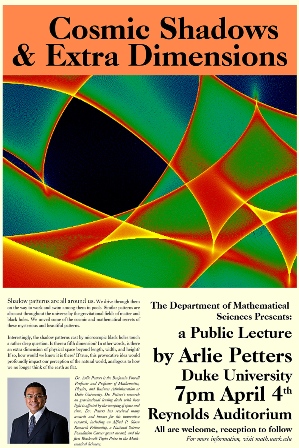
Dr. Arlie Petters of Duke University will deliver the 2013 Arkansas Public Lecture
on Thursday, April 4 at 7:00 p.m. in Reynolds Auditorium. He will speak on "Cosmic
Shadows and Extra Dimensions."
Petters is the Benjamin Powell Professor and Professor of Mathematics, Physics, and
Business Administration at Duke University. His research on gravitational lensing
deals with how light is affected by the warping of space and time. Petters has received
many awards and honors for his innovative research, including an Alfred P. Sloan Research
Fellowship, a National Science Foundation Career grant award, and the first Blackwell-Tapia
Prize in the Mathematical Sciences.
The Arkansas Public Lecture is sponsored jointly by the National Science Foundation and the University of Arkansas as part of the 38th annual Spring Lecture Series in the Mathematical Sciences.
"How the World Fits Together"
Lorenzo Sadun (University of Texas)
How the World Fits Together? Hierarchy, tilings, and structure
A special public lecture by Lorenzo Sadun, University of Texas
7 p.m. Thursday, April 12, 2012
Reynolds Center Auditorium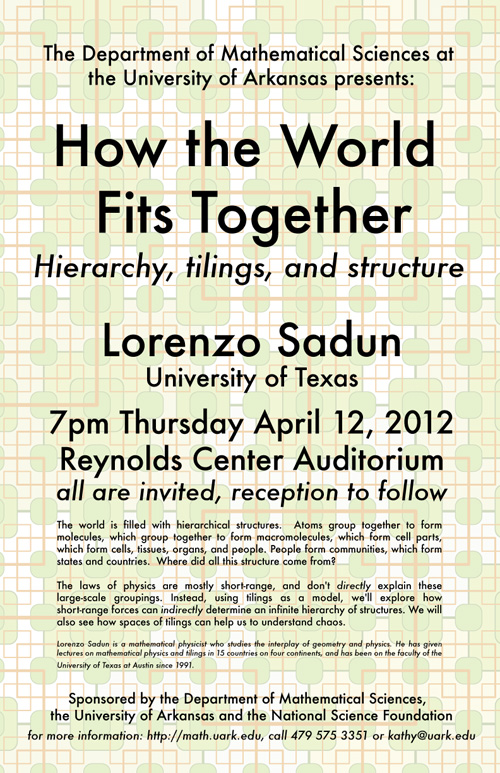
"Instant Fame - Using 2011-era Computers on Old Problems"
Ed Pegg (Wolfram Research)
Thursday, April 7, 2011
7 p.m. Reynolds Auditorium 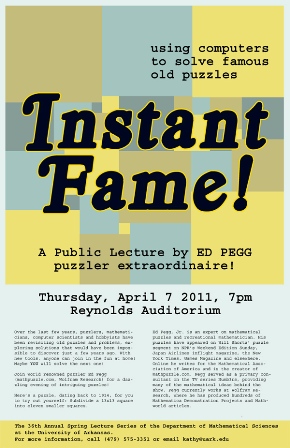
A Public Lecture by ED PEGG puzzler extraordinaire! Instant Fame! using computers to solve famous old puzzles.
Over the last few years, puzzlers, mathematicians, computer scientists and hobbyists have been revisiting old puzzles and problems, exploring solutions that would have been impossible to discover just a few years ago. With new tools, anyone can join in the fun at home! Maybe YOU will solve the next one!
Join world renowned puzzler Ed Pegg (mathpuzzle.com, Wolfram Research) for a dazzling evening of intriguing puzzles!
Here’s a puzzle, dating back to 1914, for you to try out yourself: Subdivide a 13x13 square into eleven smaller squares.
Ed Pegg, Jr. is an expert on mathematical puzzles and recreational mathematician. His puzzles have appeared on Will Shortz’ puzzle segment on NPR’s Weekend Edition Sunday, Japan Airlines inflight magazine, the New York Times, Games Magazine and elsewhere. Online he writes for the Mathematical Association of America and is the creator of mathpuzzle.com. Pegg served as a primary consultant on the TV series Numb3rs, providing many of the mathematical ideas behind the show. Pegg currently works at Wolfram Research, where he has produced hundreds of Mathematica Demonstration Projects and Mathworld articles
"Artful Number: How Mathematics is transforming our understanding of style"
Dan Rockmore (Dartmouth College)
April 15, 2010
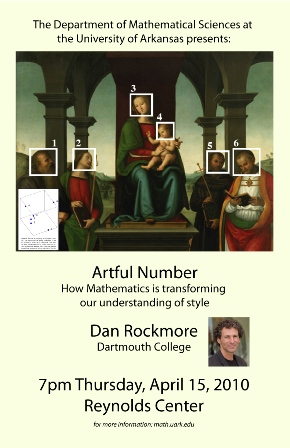
"The Mathematics of Futurama"
Michael Lacey (Georgia Tech)
April 16, 2009
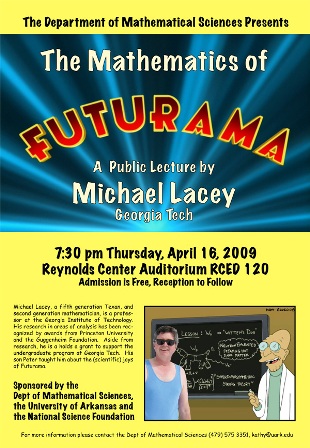
"Soap Bubbles & Mathematics"
Frank Morgan (Williams College)
April 10, 2008
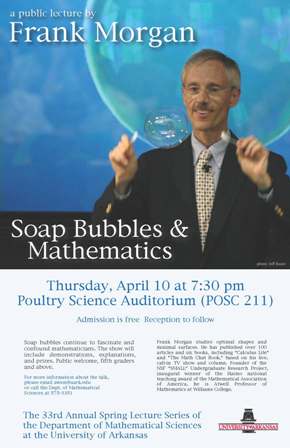
"Why is a Blue Bird Blue?"
Rodolfo H. Torres (University of Kansas)
April 15, 2004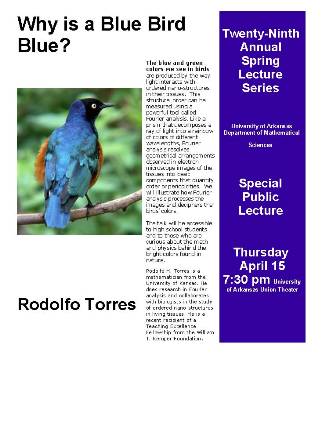
"The Shape of Space"
Jeff Weeks
Thursday, April 9, 2003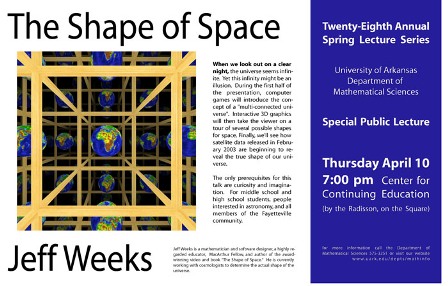
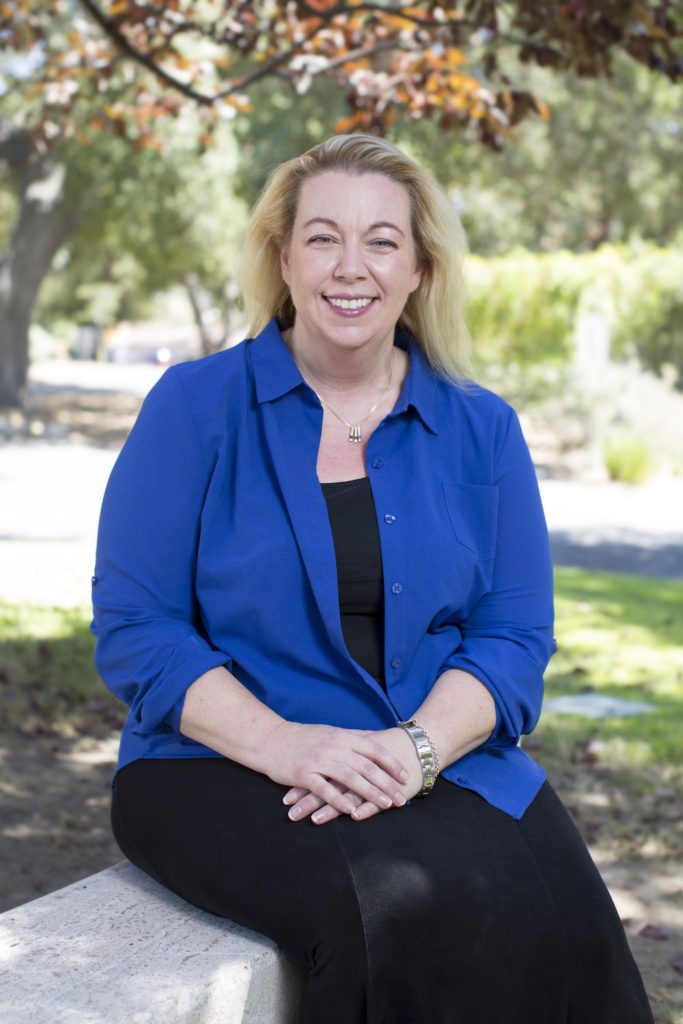 Lisette de Pillis
Lisette de Pillis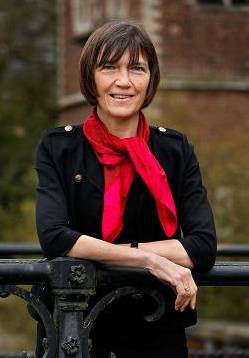 Sabine Van Huffel: Full Professor of Biomedical Engineering at the Department of Electrical Engineering
(ESAT) of the KU Leuven (period: 2002-2020) and Programme Director of the Bachelor-Master
of Science in Biomedical Engineering KU Leuven (period: 2016-2020). Since October
1, 2020, she is Professor Emerita with duties.
Sabine Van Huffel: Full Professor of Biomedical Engineering at the Department of Electrical Engineering
(ESAT) of the KU Leuven (period: 2002-2020) and Programme Director of the Bachelor-Master
of Science in Biomedical Engineering KU Leuven (period: 2016-2020). Since October
1, 2020, she is Professor Emerita with duties.